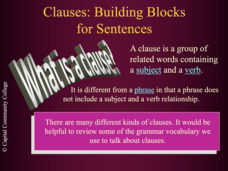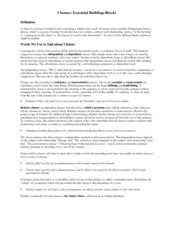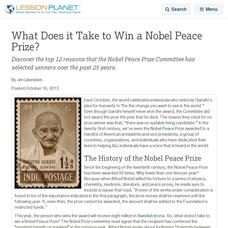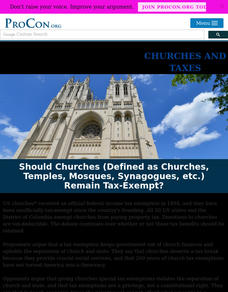Curated OER
Grammar Practice: Restrictive vs. Non-Restrictive Clauses
Go over the basics of restrictive and non-restrictive clauses with this grammar worksheet. After reviewing the concepts, as well as the definitions of parentheticals and appositives, young learners label ten sentences as restrictive or...
Curated OER
Which vs. That in Restrictive and Non-Restrictive Clauses
Should you use which or that when using a restrictive clause? What about a non-restrictive clause? Young writers practice their grammar skills with this resource, which provides a straightforward guide to which vs. that, as well as ten...
Curated OER
Clauses: Building Blocks for Sentences
Colorfully animated and packed with engaging examples, this PowerPoint encourages to employ clauses to create a variety of sentence structures. Peer editing of sample paragraphs would provide an opportunity for guided practice with...
Curated OER
Clauses: Essential Building-Blocks
Clear up clause confusion with this grammar handout, complete with a clause identification activity. Using the detailed information and examples of the different types of clauses provided in the worksheet, secondary learners identify and...
Curated OER
Adjective Clauses Using That and Which
An online lesson that clearly, if exhaustively, explains when to use "that" or "which" to begin a relative clause, specifies exceptions to the rule, and notes when to set off such clauses with commas. Learners assess their mastery...
Curated OER
Restrictive and Nonrestrictive Clauses and Appositives
In this grammar worksheet, learners label each clause as restrictive or nonrestrictive, identify all appositives and add commas accordingly in eighteen sentences.
Curated OER
Clause Practice Exercise
In this grammar instructional activity, students identify the underlined phrase or clause in twenty sentences as independent, restrictive, non-restrictive or simply a phrase.
Curated OER
Interactive Clause Quiz #1
In this grammar worksheet, students identify the underlined clause in twenty sentences as independent, an appositive, restrictive or non-restrictive.
Curated OER
Interactive Clause Quiz #2
In this grammar worksheet, students identify whether the underlined clause in twenty sentences are independent, an appositive, restrictive or non-restrictive.
Curated OER
Practice with Commas
Young grammarians practice comma usage in an interactive online quiz. Focusing mostly on restrictive/nonrestrictive clauses and the "FAN BOYS" rule, about joining two independent clauses with a conjunction, each of 10 sample sentences...
Curated OER
Reducing Adjective Clauses Part 2
For this reducing adjective clauses part 2 worksheet, students read the explanation for shortening a relative (adjective) clause with an active voice verb, then interactively completes 10 sentences by reducing the modifying clause to a...
Curated OER
Lesson 12: What Reasonable Conclusions are Possible?
Oftentimes, we jump to conclusions when we are given a limited amount of information. Take a look at reasonable conclusions with your communications studies class. If-clauses, dichotomous thinking, and assumptions are all covered with...
ClearVue
Perfect Punctuation
Using the provided "[Punctuation] Rules to Remember" young grammarians punctuate clauses, phrases, participles, and quotations in a series of worksheets.
Curated OER
Comma Practice Worksheet 3
Are you teaching the comma rules in your classroom? This resource packet covers several comma rules, gives examples of each, and provides short practice opportunities for your learners. Answers are not included.
Curated OER
Comma Practice Worksheet
Start by introducing your class to basic comma rules, and then give them this practice sheet. First, learners add commas where necessary, and then they write down which comma rule (or rules) used in each sentence. Great practice!
Heritage Foundation
The House of Representatives
The House of Representatives has a lot of responsibility in the United States government. But how did it all begin, and why is it the way it is now? A comprehensive activity answers all of these questions about the US Constitution...
Heritage Foundation
Substantive Amendments: Amendments I and II
The First and Second Amendments remain some of the most famous, even to this day. Learners read about several clauses from the US Constitution through a variety of captivating activities including before and after reading, group work,...
Curated OER
Qualifying to Vote Under Jim Crow
Literacy tests, poll taxes, grandfather laws? Scholars study the systematic ways African-Americans were kept from voting even after it was made a law. They analyze a series of primary source documents, complete a worksheet, and engaged...
Administrative Office of the US Courts
Cox v. New Hampshire
Staging a debate is a great way to class members to think deeply about issues, especially those related to rights guaranteed by the US Constitution. The Supreme Court case, Cox V. New Hampshire, focuses on the First Amendment's...
Curated OER
Relative Pronouns
In this relative pronoun worksheet, students fill in a chart showing which relative pronoun should be used in a sentence. Students are given information on informal, neutral, and formal, as well as human and non-human forms.
Curated OER
What Makes a Good Law?
Why were laws created? Spark a group discussion on why we need laws to co-exist. Should the sale of some things be outlawed on Sundays? Read a case summary between Target and the state of Minnesota that debated this issue. Ask your...
Curated OER
What Does it Take to Win a Nobel Peace Prize?
Discover the top 12 reasons that the Nobel Peace Prize Committee has selected winners over the past 25 years.
American Constitution Society
Constitution in the Classroom: The Right to Vote
The system of checks and balances is integral to the functionality of the United States government. Learn more about the ways the three branches of the government work together—and about the limitations of their power—with an informative...
Curated OER
Churches and Taxes
Churches have been tax-exempt since the founding of America, but should they be? Pupils ponder the question as they browse the website in preparation for a class debate or discussion. They research the history of tax-exemption for...

























